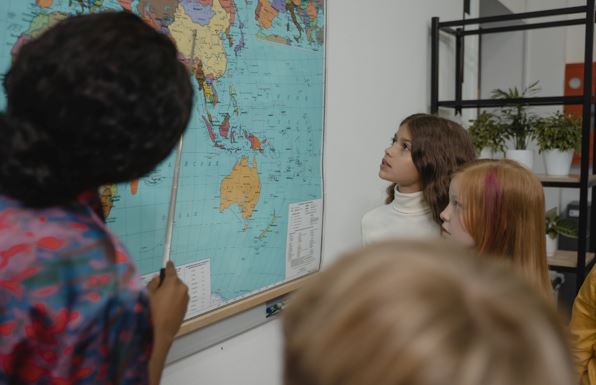Education
How Education Impacts Culture?

Education is an evident driver of cultural transmission- and, in some cases, transformation. It is challenging to comprehend this relationship because both education and culture are notoriously difficult to define precisely.
If we speak about educational institutions in general, they have two aspects: transformational and reproductive. Education has a causative impact on culture in an ideal world and vice versa and will reproduce the good while transforming the bad.
The education system’s primary goal is to pass on cultural heritage to future generations. It also assists the youngers with adjustment to any changes that have occurred or are anticipated in the future. Education is in charge of infusing all cultural values in everyday life.
It all starts in primary school, where the youngster learns the significance of living a life based on values. It solidifies culture, and culture emphasizes ethical knowledge, values, traditions, etc. It assists individuals in positively adapting to their natural and social environment.
You will see that the culture of one society may value education, and success depends on your level of education. We see that educated personnel come up with solutions to the problems in a much easier way. They contribute to raising people’s living standards, most probably because they have discovered newer, more effective ways to make life easy through learning and interactions.
Besides, education helps individuals create a lasting change by formulating policies and these policies help transform the culture of societies. It gets even better because most educational institutions offer online degree programs like a masters in education policy to help students improve the education system. Students can do this through innovative, evidence-based, and anti-racist policy formulation that assists in reshaping the perception of education.
Following are some points that highlight the impact of education on culture.
1. Transmission of culture
Education is a concerted endeavor to maintain a culture. It passes down existing beliefs, values, and traditions onto the next generations. The transmission methods may differ in each context, but without this, society’s survival may be the most difficult challenge.
It can also affect the growth and progress of mankind. The education system has modified teaching techniques, held conferences, and published papers to direct the acquisition of cultural knowledge, skills, and attitudes into social change. All of these things come together to build a personality that emerges during the process.
2. Preservation of Culture
By maintaining cultural legacy from the past to benefit current and future generations, education helps instill purposeful and well-designed techniques. Education provides opportunities for youngsters to become acquainted with their cultural treasures and support for sustaining them.
Students are known as the directors of future trends. By educating them about the significance of the culture, we can make considerable efforts in imparting knowledge. A well-informed individual is more likely to integrate cultural norms and values with everyday life.
3. Adaptation to diverse cultures
Education prepares a person to adapt to changing cultural forms and patterns to live a better and prosperous life. It promotes acceptance and prepares for challenges in a diverse environment. Old cultures are modified over time and with the changing pace of technology.
Learning new customs, languages, and traditions is difficult. However, through education and awareness, one can look forward to adapting to the new cultures. Wilhelm Meya is of the view that education imparts the benefits of adaptation and enables us to live and learn with new people and bring new ideas from different cultures.
4. Making changes in the existing culture
The most critical role of education is to change present cultural patterns in response to changing societal requirements. It promotes the culture by replacing old and obsolete cultural forms and reorienting them to meet the needs of time and man.
Education contributes to the development of culture by constantly restructuring and reconstructing human experiences. Globalization is bringing about cultural transformation, which is impacting the educational paradigm. As a result of cultural shift, cultural competency and institutional culture are two new evolving terms.
5. Development of personality
Education shapes and molds the personality, an essential aspect of culture. It cultivates pupil confidence. They get the opportunity to sit with people from different cultures, communicate and befriend them.
Healthy communication helps in learning new things, and they continue to weave a web of connections with other people in a society. It provides a strength-based perspective to the students on acquiring positive conduct, engaging in the community, and supporting academic and behavioral success. It influences the behavior of individuals desirably.
6. Help in restoring humanity through cultural diffusion
Cultural diffusion instills a good self-concept in students and equips them to work actively towards structural equality. Modern cultural values such as cooperation, unity, mutual understanding, and empathy contribute to humanity’s long-term survival. Education helps in disseminating these values in students.
Communicating in this age of influence is the best medium to practice transparency, be genuine, and be more kind. Since technology is taking us away from being human, there are still many things we can learn from indigenous people belonging to varied cultures, who emphasize restoring humanity by bringing learning into practice.
Final Words
Besides all the pointers mentioned above, education also helps in getting rid of cultural lag. Since culture takes time to catch up with innovations, technological advancements, and creativity, education acts as a catalyst by bringing awareness and imparting knowledge about the benefits of adopting new ways and technology.
Education works as an integrative force by expressing principles that unify disparate sections of society. Finally, it is vital to instill the significance of education and value-based life for genuinely sustainable growth.
Education
Applying to an English course in Birmingham: Tips and Advice


Are you considering studying English courses in Birmingham?
If so, you’re about to begin an exciting journey in language learning and cultural exposure. To ensure that your application process is smooth and successful, here are some valuable tips and advice to guide you through.
1. Research Your Options
Before you begin your application, the obvious step is to investigate your selections among the best English courses in Birmingham.
Investigate other institutions, their courses, teaching techniques, and student feedback. Consider the class size, course duration, and specialist areas of study in the English language programme.
To learn more about English courses in Birmingham, visit the websites of local universities and language schools.
- Compare course curriculums, costs, and other support services offered.
- Ask current or previous students about their experiences.
2. Understand the Application Requirements
Each English course in Birmingham may have different application requirements. Criteria such as language proficiency tests, academic credentials, recommendation letters, or personal statements.
Before submitting your application, be sure you understand the prerequisites and meet all of the admission criteria.
Tips for Meeting Application Requirements.
- Take language competence tests, such as IELTS or TOEFL, if necessary. (Typically, students from non-English backgrounds/nations must take an English language competence test to be admitted.)
- Contact teachers and mentors ahead of time to request recommendation letters.
- Write a convincing personal statement of purpose essay highlighting your passion and motivation for studying English at Birmingham.
3. Submit a Well-Crafted Application
When drafting your application, pay close attention to detail and make sure it represents your real interest in studying English. To increase your chances of admission, submit all needed documentation on time and precisely.
Strong application components include:
A strong application should include a clear and concise personal statement that reflects motivation and ambitions.
• Provide official transcripts and certifications to demonstrate your academic history.
• Provide thoughtful recommendation letters that reflect your skills and abilities.
• Check all documents for grammar and spelling mistakes before submitting.
4. Seek Scholarships and Financial Aid
Studying abroad can be costly at times, but don’t let that stop you from pursuing your aspirations.
Look at scholarship, grant, and financial aid options for international students applying to English classes in Birmingham.
International students can find funding opportunities through scholarships granted by universities, government agencies, and private institutions.
- Inquire about work-study or part-time career opportunities in Birmingham.
- Consider alternate money sources such as savings, loans, or crowdsourcing platforms.
5. Stay Positive and Persistent
The application process for an English course in Birmingham may be competitive, but don’t let that discourage you. Stay positive, be patient, and remain persistent throughout the application timeline. Remember that each step brings you closer to achieving your academic goals.
In conclusion, applying to English courses in Birmingham can be a rich experience that opens doors to new career opportunities and personal growth.
By following these tips and advice, you can navigate the application process with confidence and set yourself up for success in your academic journey. Consider enrolling today to get your journey started!
Education
High School Internships: Building Blocks for Your Future


Internships for high school are more than a mere tick on a resume. Today, they lay the foundational blocks toward a more considered and well-planned future. Navigating school years is a formidable challenge for students. However, the journey can be enriched with valuable lessons and skills acquired through internships.
Real-world Exposure:
- Internships provide high school students with a taste of working life outside the academic bubble. They offer an escape from textbooks and classrooms, presenting potential career paths to explore. This real-world exposure is invaluable for students trying to identify their early interests and passions.
Skill Development:
- Beyond textbook learning, internships offer practical application of skills. From communication and problem-solving to technical abilities, students gain hands-on experience that extends beyond traditional educational boundaries.
College Admissions Advantage:
- In the competitive race for college admissions, internships can be a significant advantage. They demonstrate to admissions officers a proactive, action-oriented approach to learning and success.
Start Early:
- Starting internships early can lead to greater success. While some programs are tailored specifically for high school students, providing a structured introduction to the working world, others span various fields like business and bio-medicine. This early exposure smooths out the transition from academic concepts to career realities.
Leverage Networking:
- Networking is crucial in career building. Internships offer high school students opportunities to connect with professionals in their field of interest. These connections can provide mentorship and valuable insights for future career endeavors.
Tailor Internships to Career Goals:
- It’s important for students to seek internships aligned with their career goals. Whether in STEM, arts, or business, targeted internships offer more focused and relevant experiences. Colleges look beyond academic scores, valuing the ability to apply theoretical knowledge in practical settings. High school internships provide a tangible demonstration of a student’s active engagement in learning and development.
Standout Applications:
- Internships enhance college applications by showcasing practical skills acquired outside the standard curriculum. These experiences make applicants stand out to admissions officers.
Demonstrating Initiative:
- Internships reflect a student’s capacity to tackle challenges and take initiative. This quality is highly valued in the college admissions process, indicating an active and dynamic approach to learning and personal development.
Insight into Chosen Field:
- For students with clear career objectives, internships provide hands-on experience in their chosen field. This direct exposure aids in making informed decisions about college courses and future professions.
Finding the Right Internship: Advice from College Admissions Experts
Embarking on a high school internship journey involves selecting the right opportunity, navigating the first day, and adapting to different professional environments.
Research Opportunities:
- Students should thoroughly research internship opportunities. Many organizations offer programs specifically designed for high school students, providing a more structured experience than self-directed options.
Seek Guidance:
- Consulting with knowledgeable counselors, such as those from IVY’D, who have experience and insights into specific internship programs, is beneficial. Their team of Ivy League graduates and admissions advisors can guide students towards internships that align with their academic, personal, and professional goals.
Leverage Resources:
- IVY’D focuses on empowering communities and individuals. They offer free college preparation workshops for nonprofits, libraries, and schools, providing students with the guidance needed to pursue higher education.
Conclusion:
Internships for high school are not just about ticking a box; they represent an investment in personal and professional growth. These experiences lay the groundwork for success in education and beyond, helping young individuals find their passion and interests. The high school internship process grants invaluable experiences, develops coping skills, and provides insightful perspectives, setting students on a path to a brighter, more informed scholarly and professional future.
Education
Decoding 2024’s Hydration Trends: Alkaline Water Vs. Hydrogen Water


In a world where health and wellness are increasingly becoming top priorities, staying hydrated has never been more critical. We’ve come a long way from simply quenching our thirst with tap water or the occasional bottled water. Today, the hydration market is flooded with various options, each claiming to offer unique benefits. Among the emerging trends in the realm of hydration, two stand out: Alkaline water and Hydrogen water.
Alkaline Water: The Basics
The pH level of alkaline water is higher than that of normal tap water. It is usually between 8 and 9 on the pH scale. Some ways to get this high pH are through ionization or adding alkaline minerals like magnesium, calcium, and potassium.
The Science Behind Alkaline Water
Proponents of alkaline water argue that it can help balance the body’s pH level, which tends to be slightly acidic. They believe that by drinking alkaline water, you can reduce the acidity in your body, potentially preventing various health issues.
Our body’s pH level is tightly regulated, and deviations from the norm can be detrimental to health. However, the body has a robust buffering system that helps maintain a stable pH within a narrow range. Skeptics argue that drinking alkaline water has minimal impact on the body’s pH, as the stomach is highly acidic to aid in digestion. When you consume alkaline water, it passes through the stomach, where the acidic environment quickly neutralizes it, making its effects on overall body pH limited.
Purported Benefits of Alkaline Water
Hydration: Because its molecules are less clumped together, alkaline water is thought to be easier for the body to absorb. But there isn’t a lot of solid evidence to back up this claim.
Antioxidant Properties: Some alkaline water enthusiasts claim that it possesses antioxidant properties due to its negative oxidation-reduction potential (ORP). Free radicals and oxidative stress can be fought with antioxidants, which may lower the chance of getting chronic illnesses.
Better Bone Health: Calcium and magnesium are chemicals that are important for bone health that are found in alkaline water. Some people say that drinking alkaline water can help keep bones from breaking.
Improved Digestion: Some people believe that alkaline water can help digestion by eliminating too much stomach acid and easing the signs of acid reflux.
Hydrogen Water: The Basics
Hydrogen-rich water, which is another name for hydrogen water, is water that has molecular hydrogen (H2) gas added to it. Molecular hydrogen is a gas that has no color or smell and has gotten a lot of attention because it might be good for your health.
The Science Behind Hydrogen Water
The concept behind hydrogen water is based on the idea that molecular hydrogen acts as a powerful antioxidant. It is believed to have the ability to neutralize harmful free radicals, reducing oxidative stress and inflammation in the body.
Hydrogen’s small molecular size allows it to penetrate cell membranes and enter the cellular compartments, where it may have a therapeutic effect. It’s thought to selectively target the most harmful free radicals, such as hydroxyl radicals, without interfering with essential signaling molecules in the body.
Purported Benefits of Hydrogen Water
Antioxidant Properties: Hydrogen water is praised for its potential to combat oxidative stress, which is implicated in various chronic diseases, including cancer, diabetes, and neurodegenerative disorders.
Improved Athletic Performance: Some studies suggest that hydrogen water may enhance physical performance by reducing muscle fatigue and promoting faster recovery.
Brain Health: Because hydrogen can pass through the blood-brain barrier, some people think it may have neuroprotective benefits that lower the chance of cognitive loss and neurodegenerative illnesses.
Skin Health: Hydrogen water is claimed to have benefits for skin health, with proponents suggesting it can reduce wrinkles, improve skin hydration, and promote a more youthful appearance.
The Debate: Alkaline Water vs. Hydrogen Water
As we’ve looked into the science and supposed benefits of both alkaline water and hydrogen water, it’s important to note that scientists are still arguing about how well they work.
Alkaline Water Debate
Critics of alkaline water argue that the body’s pH regulation is a highly complex and tightly controlled process. The body maintains a slightly acidic pH in the stomach to aid digestion, while the blood and other tissues have a stable pH range. Drinking alkaline water may have limited impact on these systems, as the body compensates for any pH fluctuations.
Furthermore, the scientific evidence supporting the health benefits of alkaline water is limited and often inconclusive. While some studies suggest potential benefits, many are small in scale, and more robust research is needed to draw definitive conclusions.
Hydrogen Water Debate
On the other hand, the best hydrogen water machine has garnered more interest from the scientific community due to its potential antioxidant properties. Several studies have explored the effects of hydrogen-rich water on various health markers, and while the results are promising, more research is needed to establish its effectiveness definitively.
One challenge in the hydrogen water debate is determining the optimal concentration of hydrogen for therapeutic effects. Too much hydrogen may have limited benefits, while too little may not yield any noticeable effects.
Considerations for Making a Choice
When considering whether to incorporate alkaline water or hydrogen water into your hydration routine, several factors should guide your decision:
Personal Health Goals: Assess your specific health needs and goals. If you are primarily concerned with reducing oxidative stress, hydrogen water may be more aligned with your objectives.
Taste and Preference: Some people prefer the taste of alkaline water over regular tap water, which may encourage increased hydration. Hydrogen water typically has no distinct taste.
Scientific Evidence: Keep in mind that both alkaline water and hydrogen water have limited conclusive scientific evidence supporting their benefits. Therefore, it’s essential to approach these options with a degree of skepticism.
Cost and Accessibility: Consider the cost and accessibility of these products in your area. Alkaline water may be more readily available, while hydrogen water may require specialized equipment or hydrogen tablets.
Consult a Healthcare Professional: A healthcare expert or nutritionist can give you personalized advice based on your health state and goals before you make any big changes to how you stay hydrated.
The Bottom Line
As of 2024, more specific ways to stay hydrated, such as alkaline water and hydrogen water, are becoming popular. Although these drinks seem like they might be good for you, it’s important to look at them with a critical eye and think about your own health goals and wants. It’s important to remember that healthy food and way of life are still the best ways to stay healthy generally. Staying hydrated is essential, but the choice between alkaline water and hydrogen water should be made with care and awareness of the available scientific evidence. Ultimately, the best hydration choice for you may be the one that aligns with your preferences and complements your overall health and wellness strategy.
-



 Biography5 years ago
Biography5 years agoJacqulyn Elizabeth Hanley is the Mother of Liza Soberano?
-



 Home4 years ago
Home4 years agoEpson L3110 Driver Free Download Latest Updated Version
-



 Games3 years ago
Games3 years agoBest Free To Play MMORPG To Try This 2021
-



 Biography5 years ago
Biography5 years agoAmanda Levy Mckeehan Biography, Family, Net Worth, Age, Affairs, Facts
-



 Biography5 years ago
Biography5 years agoWho is Rose Dorothy Dauriac? Scarlett Johansson Daughter?
-



 Biography5 years ago
Biography5 years agoJessica Ditzel Secret Information that Nobody Knows | Joe Rogan’s Wife
-



 Biography5 years ago
Biography5 years agoWhat is the relation of Nathaniel Larry Osorno with Liza Soberano?
-



 Home5 years ago
Home5 years agoLiza Soberano Biography, Age, Family and Boyfriends































